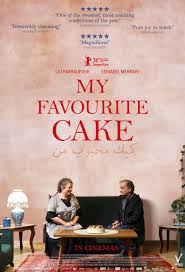
MY FAVOURITE CAKE/ Keyke mahboobe man
Iran, 2024, 97 minutes, Colour.
Lily Farhadpour, Esmaeel Mehrabi.
Directed by Maryam Moghadamm Behtash Sanaeeha.
For many decades, films from Iran have been prominent at film festivals in winning awards from Catholic and ecumenical juries. The country, often under world scrutiny and suspicion, international politics and often rigid imposition of Islamic law, has nevertheless produced a long line of films which dramatise human values, that can be appreciated worldwide.
And this is definitely the case here. The film was made in Teheran but the makers were not allowed by the government to travel to festivals to promote the film, seen to advantage in Berlin, 2024. And the film is, in many ways, critical of the law, interpretations, impositions by the morality police, especially as regards the status of women.
But, that said, this is a film which will appeal to a wide range of audiences around the world, especially female audiences. And, with the central character they did 70, a great appeal to older women.
We are introduced to a widow of 30 years, a former nurse, Mahin (a wonderfully sympathetic performance from Lily Farhadpour. Mahin is quite well off, lives alone, goes to the market, meets friendly people, cooks for a special meal for a group of old friends, women friends who gather to chat about the past but some concern about Mahin and her isolation. The women enjoy the chat, the provocation, comments about health, comments about socialising.
And the film is really about this kind of socialising, Mahin going to what used to be the Hyatt for morning tea, finding that it is now the Freedom hotel with a different style. She has coupons for a meal at a more moderate restaurant, listens to men chatting, notices an isolated elderly man hurrying through his meal. She listens to his comments to the other men, follows him out, sees that is a taxi driver…
The rest of the film is about the couple going to her home, each breaking out of their isolation, each with their own past story, some sharing of wine, some music, even dancing, food, conversation in the garden, and an increasing sense of attraction and intimacy. The two of them are more and more alive in a way that they have not been for years.
The elderly taxi driver, 70, Faramarz, is played by veteran Iranian he is a wonderful presence. Actor, Esmaeel Mehrabi. He is charismatic in his way but, one soon realises, that we are responding to him, not as an actor playing a role, but as the actual character, as if we were watching him in documentary reality.
Part of the conversation highlights the subordinate role of women in Iranian society, the strictness of the control by authorities.
However, audiences will be glad to have made the acquaintance of Mahin and Faramarz, to have shared their moments of happiness and, poignantly, moments of sadness.
- The focus on life in Iran during the Islamic Republic, the focus on women, middle-class ageing women, loneliness, companionship?
- The Iranian setting, the home and garden, the restaurants, the markets, taxi rides, sense of realism? The musical score and background? Persian songs?
- The story of Mahin, 70 years old, 30 years a widow, children overseas, her career as a nurse, retirement, the comfortable home, undocumented and likely to being taken by the government, the interiors, her garden and its importance? Her waking up in the morning, sleeping till noon, phone calls, going to the market, the taxi ride, the driver carrying her goods, her cooking?
- The reunion of the friends, their chatter, a focus on ageing, ailments and illnesses, focus on relationships and memories, Mahin presiding, enjoying the visit, the urging of her to make friends and go out?
- Phone calls with her daughter, images, the little boy and brushing his teeth, the daughter and her concern?
- Her going to the hotel, her pension cards, the change in the former Hyatt to Freedom? Her being outdated even on the drinks?
- At home, quiet, watching television, weeping at the television films?
- Iranian top directors and their many episodes in films of taxi rides, car rides, interiors, different angles? And the taxi rides in this film?
- The decision to go out, going to the restaurant, sitting at the table, the four men and their discussions, on going to protests? Seeing Faramarz’s sitting alone, eating, the taxi driver, comments to the men? Mahin watching him?
- His leaving, taxi driver, going to the headquarters, Mahin following him, the enquiries, waiting for him to return, the conversation, asking him to drive her home, his stopping for the medication, the rain? His willingness to visit, parking the car at a distance, her going in, make up, getting herself ready, change of address? The nosy neighbours, the visit of the woman who heard voices, Mahin making excuses?
- The character of Faramarz, his story, military service, not believing in the war, his pension, the brief set up of his marriage, the divorce, living alone, each day the same as the next? The attraction, he and her hopes?
- The process of the evening, the chat, the food, the wine, his drinking readily, her preparing the food, the herbs from the garden, his fixing the lights? The shower, sitting in their clothes? The aftermath, more conversation, sharing of memories? The music, Mahin dancing, Faramarz’s gradually dancing, the exuberance? The discussions about relationships, intimacy, sexuality?
- Faramarz, the drinking, effort, his going to lie down? Mahin discovering him, disbelief, his death? Waiting, washing him, covering him, the digging of the hole in the garden? Drag him out, the burial?
- The finale, the camera at Mahin’s back, the audience contemplating what it happened?